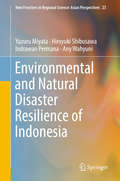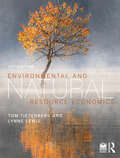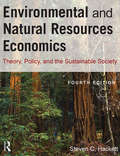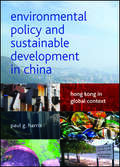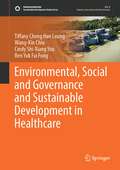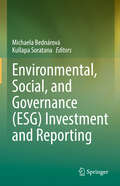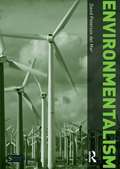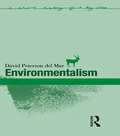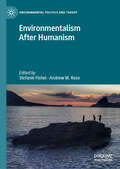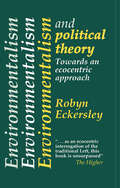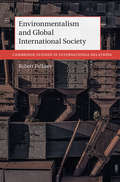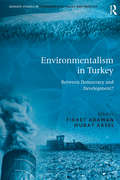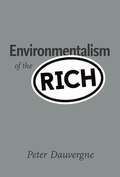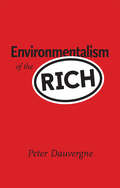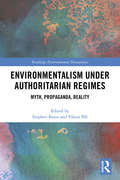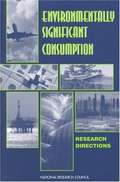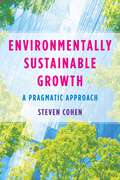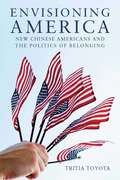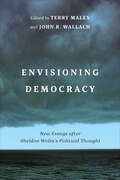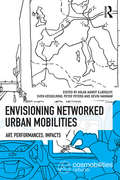- Table View
- List View
Environmental and Natural Disaster Resilience of Indonesia (New Frontiers in Regional Science: Asian Perspectives #23)
by Hiroyuki Shibusawa Yuzuru Miyata Indrawan Permana Any WahyuniThis study aims at analyzing the resilience of Indonesia from two aspects: one is was natural disaster and the other is environmental protection. Therefore the study comprises two parts. The first aims at analyzing Palangkaraya City in Central Kalimantan Province by constructing apartial and a general equilibrium models; hence the existence of illegal settlements can be explained systematically. The models demonstrates a new attempt in city analysis by introducing the expected flood damage rate on households’ assets. Furthermore, a numerical simulation shows a new finding, namely, that the bid rent by representative low-income households in flood-prone areas canreceive higher than the bid rent by the representative high-income households. The second part examines (1) the provision of public goods such as road construction on the Maros–Watampone Road, and (2) the urban economics of Makassar City. In this second part, the analytic hierarchy process is applied to design efficiency with respect to selecting the best type of road construction in a conservation area. As a result, the elevated bridge is determined to be the most suitable type of construction, followed by cut-and-fill and the tunnel system. The second research approach uses a computable general equilibrium (CGE) model that adds environmental objectives to urban economic objectives in Makassar City. The model examines the impact of the carbon tax based on the 2006 input–output table for Makassar City. The results of all simulations of the CGE model indicates that a carbon tax can reduce the volume of CO2 emissions by 8 %.
Environmental and Natural Resource Economics
by Tom Tietenberg Lynne LewisEnvironmental and Natural Resource Economics is one of the most widely used textbooks for environmental economics and natural resource economics courses, offering a policy-oriented approach and introducing economic theory and empirical work from the field. Students will develop a global perspective of both environmental and natural resource economics and how they interact. This 12th edition provides updated data, new studies, and more international examples. There is a considerable amount of new material, with a deeper focus on climate change and coverage of COVID-19, social justice, and the circular economy. Key features include: Extensive coverage of major contemporary issues including climate change, water and air pollution, resource allocation, biodiversity protection, sustainable development, and environmental justice. Four chapters specifically devoted to climate economics, including chapters on energy, climate mitigation, carbon pricing, and adaptation to climate change. Introductions to the theory and method of environmental economics, including externalities, benefit-cost analysis, valuation methods, and ecosystem goods and services and updates to the social cost of carbon. New examples and debates throughout the text, highlighting global cases and major talking points. Environmental and Natural Resource Economics supports students with end-of-chapter summaries, discussion questions, exercises, and further reading in the book, and the companion website offers additional learning and teaching resources.
Environmental and Natural Resources Economics: Theory, Policy, and the Sustainable Society
by Steven C. HackettExtensively revised and updated, this popular text presents an accessible yet rigorous treatment of environmental and natural resources economics, including climate change and the economics of sustainability. Completely revised and updated, the fourth edition now includes new figures and tables, definitions to assist the reader, and updated policy information. New advances in the science, economics and policy approaches to climate change have been integrated into essentially all-new chapters on incentive regulation and global climate change. This innovative textbook integrates economics with science and public policy in a balanced and accessible way that will be appreciated by students from disciplines ranging from economics and natural resources management to environmental studies and energy policy.
Environmental and Nuclear Networks in the Global South: How Skills Shape International Cooperation (Structural Analysis in Social Sciences)
by Isabella AlcañizFor decades, expert bureaucrats have been moving regularly across borders, from their home institutions to international organizations, and forging collaborative networks with peers. Analyzing over twenty years of environmental and nuclear technology projects data for 150 countries, this book provides a comprehensive study of international cooperation among elite bureaucrats in developing states. An empirical study that will interest researchers, undergraduate, and graduate students of political and social sciences, this is the first book to explain the causes of transnational cooperation in the Global South and find a link between domestic level of skills and international cooperation. The author methodically illustrates how state experts with high skills can reap the benefits of international technical cooperation. In contrast, bureaucrats with low skills cannot forge stable collaborative ties with foreign peers and gain little from participating in these transgovernmental networks. A comprehensive study of transnational environmental and nuclear cooperation in the Global South. Compares state bureaucracies in Latin America, Africa, and Asia. Covers mixed methods design of social network analysis and features in-depth interviews.
Environmental policy and sustainable development in China: Hong Kong in Global Context
by Paul G. HarrisDrawing on practices and theories of sustainability, Environmental policy and sustainable development in China explores the prospects for achieving environmentally benign economic and social development in China and beyond. Using the Chinese 'world city' of Hong Kong as a backdrop and case study, it introduces major conceptions of sustainability, describes historical and political contexts for environmental policymaking, and analyses key challenges related to sustainable development, including air pollution, water quality, waste, transport and climate change. The book will be a valuable and unique resource for students, teachers and readers interested in environmental policy, sustainable development and ecological governance, especially in China and Hong Kong. All of the author's royalties from sales of this book will be donated by Policy Press to Friends of the Earth (Hong Kong) and WWF (Hong Kong).
Environmental, Social and Governance and Sustainable Development in Healthcare (Sustainable Development Goals Series)
by Ben Yuk Fong Tiffany Cheng Leung Wang-Kin Chiu Cindy Shi-Xiang YouThis book applies environmental, social and governance (ESG) to issues of sustainable development in healthcare. ESG reporting has been widely used for some time in the business industry to show the economic, social and environmental responsibilities of companies that aim to achieve superior ESG performance for lower risk, more accountability and transparency. Moreover, public-listed companies in healthcare have been growing in significant numbers in recent years. The application or practice of ESG in healthcare has become a growing trend for these large organisations looking to demonstrate their strengths in areas of financing, operations, sustainability and social responsibilities. Such an approach is essential not only for the long-term development of the companies but also for services delivered by healthcare practitioners. Equally, the implications to Sustainable Development Goal (SDG) 3 is relevant to healthcare worldwide with a growing ageing population, which has led to a great burden of care in many countries, particularly in the public sector. The potential development and expansion in private healthcare services, accelerated by technology advancement, has demanded a new paradigm in the healthcare industry, particularly in business, service delivery and policy. The book examines this paradigm through health in all policies, ESG and SDG 3 objectives, research, training and practice. It is relevant to graduate students and scholars working in areas relating to health, business and the SDGs and is also useful to policymakers and practitioners in healthcare.
Environmental, Social, and Governance (ESG) Investment and Reporting
by Kullapa Soratana Michaela BednárováThis volume provides comprehensive coverage of ESG (Environmental, Social, and Governance) principles, offering an exhaustive examination of foundational concepts, specific factors, and their integration into investment analysis, ensuring a holistic understanding of the subject. It places a strong emphasis on the ethics of investing, exploring the importance of aligning investments with personal and societal values, which enriches the reader's ethical perspective. Practical insights are provided through real-world examples and case studies, making the content more relatable and actionable. The textbook also introduces cutting-edge concepts such as Corporate Digital Responsibility and ESGD reporting, preparing readers for future developments in ESG practices and keeping them ahead of industry trends. Detailed examinations of various global ESG reporting frameworks and standards, like GRI, IR, SASB, IISB, and ESRS, equip readers with the knowledge to choose the most appropriate methods for their needs. Emphasizing the seamless integration of ESG factors into traditional investment analysis, the book enhances readers' analytical skills and demonstrates how ESG considerations can be incorporated into all aspects of investment decision-making. Additionally, by addressing contemporary issues like greenwashing and bluewashing, it makes readers aware of the ethical challenges in ESG reporting and communication, equipping them to navigate these complexities effectively. Key takeaways include an in-depth understanding of ESG principles and their impact on investment decisions, insights into ethically integrating ESG considerations into investment strategies, and practical application skills through case studies. The forward-looking content ensures readers are prepared for future trends in ESG reporting and investing, including the impact of new technologies. Familiarity with various global standards allows readers to select suitable methodologies for their contexts. The focus on holistic integration of ESG factors improves analytical capabilities, making readers adept at identifying ESG risks and opportunities. This ESG investment and reporting book is intended for a diverse audience spanning academia, professionals, and classrooms alike. Academically, it serves as a comprehensive resource for students studying finance, business management, sustainability, or related fields, offering in-depth insights into the integration of Environmental, Social, and Governance (ESG) factors into investment strategies and reporting practices. Professionals in finance, investment management, corporate governance, sustainability consulting, and ESG reporting will find it invaluable for enhancing their understanding and practical application of ESG principles in their respective industries. Additionally, educators can leverage this book as a teaching tool in university courses focusing on sustainable finance, corporate governance, or ESG investing, providing students with practical knowledge and real-world examples to enrich their learning experience.
Environmentalism (Seminar Studies)
by David Peterson Del MarWhy are our environmental problems still growing despite a huge increase in global conservation efforts? Peterson del Mar untangles this paradox by showing how prosperity is essential to environmentalism. Industrialization drove people to look for meaning in nature even as they consumed its products more relentlessly. Hence England led the way in both manufacturing and preserving its countryside, and the United States created a matchless set of national parks as it became the world's pre-eminent economic and military power.Environmental movements have produced some impressive results, including cleaner air and the preservation of selected species and places. But agendas that challenged western prosperity and comfort seldom made much progress, and many radical environmentalists have been unabashed utopianists. Environmentalism considers a wide range of conservation and preservation movements and less organized forms of nature loving (from seaside vacations to ecotourism) to argue that these activities have commonly distracted us from the hard work of creating a sustainable and sensible relationship with the environment.
Environmentalism (Short Histories of Big Ideas)
by David Peterson Del MarEnvironmental movements have produced some impressive results, including cleaner air and the preservation of selected species and places. But movements that challenged western prosperity and comfort seldom made much progress, and many radical environmentalists have been unabashed utopianists. In this short guide, Peterson del Mar untangles this paradox by showing how prosperity is essential to environmentalism. Industrialisation made conservation sensible, but also drove people to look for meaning in nature even as they consumed its products more relentlessly. Hence Englandled the way in both manufacturing and preserving its countryside, and the United Statescreated a matchless set of national parks as it became the world's pre-eminent economic and military power. Environmentalismconsiders both the conservation and preservation movements and less organized forms of nature loving (from seaside vacations to ecotourism) to argue that these activities have commonly distracted us from the hard work of creating a sustainable and sensible relationship with the environment.
Environmentalism After Humanism (Environmental Politics and Theory)
by Andrew M. Rose Stefanie FishelThis book explores the ways in which one might come to recognize and better theorize the political actor, and the political ‘act,’ or ‘event,’ in a post-anthropocentric context. The challenge to contemporary ideas of citizenship, activism, and the state stems not only from the realization that the natural world is inseparable from the social, but that both are the product of hybridized human and nonhuman agencies. As a result, one must be skeptical of any notion of an environmental fix that bases itself upon an exclusively human agency. What new types of citizenship might emerge from posthuman cultures and artforms? What do effective post-anthropocentric organizing strategies look like? As the relevance of the liberal humanist political subject and the conceptual posthuman of political realism recede, theories of national and international politics are now tasked with rethinking a contemporary environmental politics beyond humanism. To better theorize these destabilizations, this collection puts forth the value of thinking across disciplines, wherein a conversation unfolds between political theory and literary theory that meets at the crossroads of environmental humanities and ecopolitical theory.
Environmentalism And Political Theory: Toward An Ecocentric Approach (Suny Series In Environmental Public Policy Ser.)
by Robyn EckersleyThis book represents the consolidation of a new field of political enquiry that is becoming an increasingly important component of political studies throughout the world. Eckersley's interdisciplinary study builds bridges between environmental philosophy, ecological thought and political enquiry, using a range of new insights from environmental philosophy to outline a particular Green political perspective. Aims to provide a detailed and comprehensive examination of the impact of environmentalism on contemporary political thought.
Environmentalism and Global International Society (Cambridge Studies in International Relations #156)
by Robert FalknerEnvironmentalism and Global International Society reveals how environmental values and ideas have transformed the normative structure of international relations. Falkner argues that environmental stewardship has become a universally accepted fundamental norm, or primary institution, of global international society. He traces the history of environmentalism's rise from a loose set of ideas originating in the nineteenth century to a globally applicable norm in the twentieth century, which has come to redefine international legitimacy and states' global responsibilities. He shows how this deep norm change came about as a result of the interplay between non-state and state actors, and how the new environmental norm has interacted with the existing primary institutions of global international society, most notably sovereignty and territoriality, diplomacy, international law, and the market. This book shifts the attention from the presentist focus in the study of global environmental politics to the longue durée of global norm change in the greening of international relations.
Environmentalism in Turkey: Between Democracy and Development? (Routledge Studies in Environmental Policy and Practice)
by Fikret AdamanBringing together a mixture of theoretical discussion, political analyses and illustrative case studies, this volume provides the first comprehensive scholarly analysis of the tension between environmental protection and economic development in Turkey. Through its dual focus on democratization and modernization, this book also makes an important contribution to the literature on politics in contemporary Turkey. It identifies and analyses the forces underwriting the growth of environmental social movements, investigates the impacts these movements have on development and modernization, and above all, evaluates the role played by environmental movements in the democratization process of Turkey.
Environmentalism of the Rich
by Peter DauvergneOver the last fifty years, environmentalism has emerged as a clear counterforce to the environmental destruction caused by industrialization, colonialism, and globalization. Activists and policymakers have fought hard to make the earth a better place to live. But has the environmental movement actually brought about meaningful progress toward global sustainability? Signs of global "unsustainability" are everywhere, from decreasing biodiversity to scarcity of fresh water to steadily rising greenhouse gas emissions. Meanwhile, as Peter Dauvergne points out in this provocative book, the environmental movement is increasingly dominated by the environmentalism of the rich -- diverted into eco-business, eco-consumption, wilderness preservation, energy efficiency, and recycling. While it's good that, for example, Barbie dolls' packaging no longer depletes Indonesian rainforest, and that Toyota Highlanders are available as hybrids, none of this gets at the source of the current sustainability crisis. More eco-products can just mean more corporate profits, consumption, and waste.Dauvergne examines extraction booms that leave developing countries poor and environmentally devastated -- with the ruination of the South Pacific island of Nauru a case in point; the struggles against consumption inequities of courageous activists like Bruno Manser, who worked with indigenous people to try to save the rainforests of Borneo; and the manufacturing of vast markets for nondurable goods--for example, convincing parents in China that disposable diapers made for healthier and smarter babies.Dauvergne reveals why a global political economy of ever more -- more growth, more sales, more consumption -- is swamping environmental gains. Environmentalism of the rich does little to bring about the sweeping institutional change necessary to make progress toward global sustainability.
Environmentalism of the Rich
by Peter DauvergneWhat it means for global sustainability when environmentalism is dominated by the concerns of the affluent—eco-business, eco-consumption, wilderness preservation. Over the last fifty years, environmentalism has emerged as a clear counterforce to the environmental destruction caused by industrialization, colonialism, and globalization. Activists and policymakers have fought hard to make the earth a better place to live. But has the environmental movement actually brought about meaningful progress toward global sustainability? Signs of global “unsustainability” are everywhere, from decreasing biodiversity to scarcity of fresh water to steadily rising greenhouse gas emissions. Meanwhile, as Peter Dauvergne points out in this provocative book, the environmental movement is increasingly dominated by the environmentalism of the rich—diverted into eco-business, eco-consumption, wilderness preservation, energy efficiency, and recycling. While it's good that, for example, Barbie dolls' packaging no longer depletes Indonesian rainforest, and that Toyota Highlanders are available as hybrids, none of this gets at the source of the current sustainability crisis. More eco-products can just mean more corporate profits, consumption, and waste. Dauvergne examines extraction booms that leave developing countries poor and environmentally devastated—with the ruination of the South Pacific island of Nauru a case in point; the struggles against consumption inequities of courageous activists like Bruno Manser, who worked with indigenous people to try to save the rainforests of Borneo; and the manufacturing of vast markets for nondurable goods—for example, convincing parents in China that disposable diapers made for healthier and smarter babies. Dauvergne reveals why a global political economy of ever more—more growth, more sales, more consumption—is swamping environmental gains. Environmentalism of the rich does little to bring about the sweeping institutional change necessary to make progress toward global sustainability.
Environmentalism under Authoritarian Regimes: Myth, Propaganda, Reality (Routledge Environmental Humanities)
by Viktor Pál Stephen BrainSince the early 2000s, authoritarianism has risen as an increasingly powerful global phenomenon. This shift has not only social and political implications, but also environmental implications: authoritarian leaders seek to recast the relationship between society and the government in every aspect of public life, including environmental policy. When historians of technology or the environment have investigated the environmental consequences of authoritarian regimes, they have frequently argued that authoritarian regimes have been unable to produce positive environmental results or adjust successfully to global structural change, if they have shown any concern for the environment at all. Put another way, the scholarly consensus holds that authoritarian regimes on both the left and the right generally have demonstrated an anti-environmentalist bias, and when opposed by environmentalist social movements, have succeeded in silencing those voices. This book explores the theme of environmental politics and authoritarian regimes on both the right and the left. The authors argue that in instances when environmentalist policies offer the possibility of bolstering a country’s domestic (nationalist) appeal or its international prestige, authoritarian regimes can endorse and have endorsed environmental protective measures. The collection of essays analyzes environmentalist initiatives pursued by authoritarian regimes, and provides explanations for both the successes and failures of such regimes, looking at a range of case studies from a number of countries, including Brazil, China, Poland, and Zimbabwe. The volume contributes to the scholarly debate about the social and political preconditions necessary for effective environmental protection. This book will be of great interest to those studying environmental history and politics, environmental humanities, ecology, and geography.
Environmentally Significant Consumption: Research Directions
by Committee on the Human Dimensions of Global ChangeThere has been much polemic about affluence, consumption, and the global environment. For some observers, "consumption" is at the root of global environmental threats: wealthy individuals and societies use far too much of the earth's resource base and should scale back their appetites to preserve the environment for future generations and allow a decent life for the rest of the world. Other observers see affluence as the way to escape environmental threats: economic development increases public pressure for environmental protection and makes capital available for environmentally benign technologies. The arguments are fed by conflicting beliefs, values, hopes, and fears--but surprisingly little scientific analysis.This book demonstrates that the relationship of consumption to the environment needs careful analysis by environmental and social scientists and conveys some of the excitement of treating the issue scientifically. It poses the key empirical questions: Which kinds of consumption are environmentally significant? Which actors are responsible for that consumption? What forces cause or explain environmentally significant consumption? How can it be changed? The book presents studies that open up important issues for empirical study: Are there any signs of saturation in the demand for travel in wealthy countries? What is the relationship between environmental consumption and human well-being? To what extent do people in developing countries emulate American consumption styles? The book also suggests broad strategies that scientists and research sponsors can use to better inform future debates about the environment, development, and consumption.
Environmentally Sustainable Growth: A Pragmatic Approach
by Steven CohenHow do we move away from the current environmentally destructive economic system toward one that is more sustainable while still ensuring continued economic growth? This book offers a positive vision of an environmentally sustainable future and lays out the steps ahead as we make the transition.Steven Cohen explores the causes of environmental degradation and examines what sustainability looks like in practice. He outlines realistic paths toward a renewable resource–based economy, demonstrating that, in many respects, the shift to sustainability is already underway. Cohen describes a range of public policy and infrastructure initiatives that can encourage cleaner production in the private sector and consumption in everyday life. He argues that the politics, advocacy, and communication around environmental protection must change to emphasize successes, reduce scare tactics, and make sure that the lifestyles and careers associated with a more sustainable world sound attractive to a wide range of people. The book depicts an appealing and equitable future that assures quality of life while protecting the planet.Environmentally Sustainable Growth brings together insights from many disciplines, spanning the latest scholarship and practical experience. Useful for students and courses, this book will be informative for practitioners, managers, analysts, activists, and scholars whose work incorporates environmental sustainability.
Envisioning Abolition: Socialism, Anarchism and Penal Abolitionism in the Nineteenth and Early Twentieth centuries
by David Gordon Scott and Emma BellAbolitionist thought visualizes a world without prisons – or a radical reduction or transformation of prisons and punishment. This fascinating book explores the abolitionist ideas of key early socialists and anarchists, writing from the late 18th to the early 20th centuries. It considers how these radical thinkers can provide insights into our present condition, both by highlighting the harms of punishment and by pointing to inspiring alternatives to current policy and practice. By examining their calls for the ending of legal coercion, domination and repression, the book shows how the ideas of early socialists and anarchists can assist those engaging in emancipatory struggles against penal and social injustice today.
Envisioning America
by Tritia ToyotaIt was as a television journalist of color in the Los Angeles area beginning during the 1960s that Toyota (anthropology and Asian American studies, U. of California-Los Angeles) witnessed most of the struggle of Chinese American community there to forge a political identity. She discusses transforming the field, history and race, envisioning America, California lifestyles, coming of age, seeking new allies and building new community, and the 21st century. Annotation c2010 Book News, Inc. , Portland, OR (booknews. com)
Envisioning Better Communities: Seeing More Options, Making Wiser Choices
by Randall ArendtThe author's work has shaped a generation of planners, designers, and landscape architects. In this book, the author brings his insights to a broader public, with a profusely illustrated demonstration of how local officials, planning commissioners, and everyday citizens can work to make their communities more attractive, more habitable, and more sustainable. Despite the widespread acceptance of good design and planning principles throughout the professions, too many of our towns and rural areas remain needlessly ugly and inefficient. In side by side comparisons of similar places and kinds of buildings, the author shows that we need not live amid sprawling, characterless visual blight. Simple design choices and effective municipal decisions can have tremendous impacts on the quality of our communities. Written in the author's well-known clear, accessible, nontechnical style, this book creates a sense of hope for those who face the everyday challenges of working with developers and landowners to create places that make economic, environmental, and aesthetic sense. The author shows us that with diligence, thoughtfulness, and care, we can make our communities better in countless ways.
Envisioning Black Colleges: A History of the United Negro College Fund
by Marybeth GasmanThe multifaceted story of the UNCF.Winner, Outstanding Publication Award, American Educational Research AssociationEtched into America's consciousness is the United Negro College Fund's phrase "A mind is a terrible thing to waste." This book tells the story of the organization's efforts on behalf of black colleges against the backdrop of the cold war and the civil rights movement.Founded during the post–World War II period as a successor to white philanthropic efforts, the UNCF nevertheless retained vestiges of outside control. In its early years, the organization was restrained in its critique of segregation and reluctant to lodge a challenge against institutional and cultural racism. Through cogent analysis of written and oral histories, archival documents, and the group's outreach and advertising campaigns, historian Marybeth Gasman examines the UNCF’s struggle to create an identity apart from white benefactors and to evolve into a vehicle for black empowerment.The first history of the UNCF, Envisioning Black Colleges draws attention to the significance of black colleges in higher education and the role they played in Americans’ struggle for equality.
Envisioning Democracy: New Essays after Sheldon Wolin’s Political Thought
by Terry Maley John R. WallachFew terms elicit such strong and varied feelings and yet have so little clarity as "democracy." Leaders of large states use "democracy" to designate their nations’ public character even as critics and rivals use the term to validate their own political perspectives. In Envisioning Democracy, the editors and contributors address the following questions: What does democracy mean today? What could it mean tomorrow? What is the dynamic of democracy in an increasingly interdependent world? Envisioning Democracy explores these questions amid the dynamic of democracy as a political phenomenon interacting with forms of economic, ethical, ethnic, and intellectual life. The book draws on the work of Sheldon S. Wolin (1922–2015), one of the most influential American theorists of the last fifty years. Here, scholars consider the historical conditions, theoretical elements, and practical impediments to democracy, using Wolin’s insights as touchstones in thinking through the possibilities and obstacles facing democracy now and in the future.
Envisioning Networked Urban Mobilities: Art, Performances, Impacts (Networked Urban Mobilities Series)
by Kevin Hannam Sven Kesselring Aslak Aamot Kjaerulff Peter PetersEnvisioning Networked Urban Mobilities brings together scientific reflections on the relations of art and urban mobilities and artistic research on the topic. The editors open the book by setting out the concept grounded in the exhibition curated by Aslak Aamot Kjærulff and refers to earlier work on mobilities and art generated by the Cosmobilities Network. This third volume has two sections, both consisting of short papers and illustrations. The first section is based on artists who were part of the conferences' art exhibition, and the second part is based on theoretical reflections on art and artists.
Envisioning Socialism: Television And The Cold War In The German Democratic Republic
by Heather GumbertEnvisioning Socialism examines television and the power it exercised to define the East Germans’ view of socialism during the first decades of the German Democratic Republic. In the first book in English to examine this topic, Heather L. Gumbert traces how television became a medium prized for its communicative and entertainment value. She explores the difficulties GDR authorities had defining and executing a clear vision of the society they hoped to establish, and she explains how television helped to stabilize GDR society in a way that ultimately worked against the utopian vision the authorities thought they were cultivating. Gumbert challenges those who would dismiss East German television as a tool of repression that couldn’t compete with the West or capture the imagination of East Germans. Instead, she shows how, by the early 1960s, television was a model of the kind of socialist realist art that could appeal to authorities and audiences. Ultimately, this socialist vision was overcome by the challenges that the international market in media products and technologies posed to nation-building in the postwar period. A history of ideas and perceptions examining both real and mediated historical conditions, Envisioning Socialism considers television as a technology, an institution, and a medium of social relations and cultural knowledge. The book will be welcomed in undergraduate and graduate courses in German and media history, the history of postwar Socialism, and the history of science and technologies.
